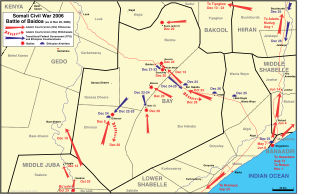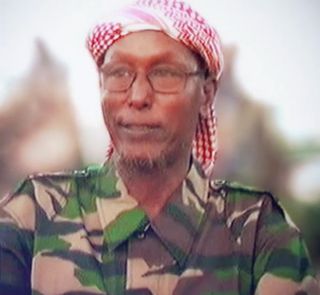
Kismayo is a port city in the southern Lower Juba province of Somalia. It is the commercial capital of the autonomous Jubaland region.

The Islamic Courts Union was a legal and political organization founded by Mogadishu-based Sharia courts during the early 2000s to combat the lawlessness stemming from the Somali Civil War. By mid-to-late 2006, the Islamic Courts had expanded their influence to become the de facto government in most of southern and central Somalia, succeeding in creating the first semblance of a state since 1991.

Sheikh Hassan Dahir Aweys (English: Hassan Dahir Aweys (Somali: Xasan Daahir Aweys, is a Somali Islamist political figure.

The Ethiopian invasion of Somalia, also known as the Ethiopian occupation of Somalia or the Ethiopian intervention in the Somali Civil War, was an armed conflict that lasted from late 2006 to early 2009. It began when military forces from Ethiopia, supported by the United States, invaded Somalia to depose the Islamic Courts Union (ICU) and install the Transitional Federal Government (TFG). The conflict continued after the invasion when an anti-Ethiopian insurgency emerged and rapidly escalated. During 2007 and 2008, the insurgency recaptured the majority of territory lost by the ICU.

The 2006 Islamic Courts Union offensive is the period in the Somali Civil War that began in May 2006 with the Islamic Courts Union's (ICU) conquest of Mogadishu from the Alliance for the Restoration of Peace and Counter-Terrorism (ARPCT) and continued with further ICU expansion in the country. Following the outbreak of the war on December 21, 2006; by December 24, direct Ethiopian intervention in the conflict in support of the Transitional Federal Government (TFG) was no longer denied by the Ethiopian government. The Eritrean government denied any involvement despite Ethiopian claims to the contrary.

The Battle of Baidoa began on 20 December 2006 when the Somali transitional federal government forces (TFG) allied with Ethiopian forces stationed there attacked advancing Islamic Courts Union (ICU) forces along with 500 alleged Eritrean troops and mujahideen arrayed against them.

The fall of Mogadishu occurred on 28 December 2006, when the Ethiopian National Defence Forces (ENDF) advanced into the capital to install the Transitional Federal Government (TFG). The Islamic Courts Union (ICU), which had controlled the capital since June 2006, withdrew from the city after a week of fighting ENDF/TFG forces in southern and central Somalia.

The transitional federal government (TFG) was the government of Somalia between 2004 and 2012. Established 2004 in Djibouti through various international conferences, it was an attempt to restore national institutions to the country after the 1991 collapse of the Siad Barre government and the ensuing Somali Civil War.

The Battle of Jilib took place on the last day of 2006 during the Ethiopian invasion of Somalia. It was fought when Ethiopian National Defence Force (ENDF) troops and Transitional Federal Government (TFG) militia launched an offensive on the town of Jilib, held by the Islamic Courts Union (ICU).
After two decades of violence and civil war and after the Transitional Federal Government (TFG) of Somalia captured Mogadishu and Kismayo, the TFG attempted to disarm the militias of the country in late 2006. According to the UN/World Bank's Joint Needs Assessment (JNA) coordination secretariat, "the total estimated number of militias [militia members] to be demobilized is 53,000." In 2005, they estimated that "there are 11–15,000 militia people controlling Mogadishu ."

Fuad Mohamed Qalaf, also known as Fuad Shangole, is a Somali-Swedish militant who is a senior member of Al-Shabaab.

Sheikh Hassan Abdullah Hersi al-Turki was a Somali Islamist who was a senior leader within al-Itihaad al-Islamiya (AIAI) and the Islamic Courts Union (ICU).
The timeline of events in the War in Somalia during 2006 is set out below.

The timeline of events in the War in Somalia during 2007 is set out below.

The 2009 timeline of events in the Somalia War (2006–2009) during January 2009 is set out below. From the beginning of February the timeline of events in the Somali Civil War (2009–present) is set out following the conclusion of the previous phase of the civil war.

Hizbul Islam, also known as Hizbul Islaami, Hisbi Islam, or Hezb-ul Islam, was a Somali Islamist group formed after four Islamist groups merged to oppose the new Somali government of President Sheikh Sharif Ahmed. The four groups were: Hassan Aweys' the ARS-A, Jabhatul Islamiya, Hassan Abdullah Hersi al-Turki's the Mu'askar Ras Kamboni and Muaskar Anole, the Marehan clan's Militia and Harti clan's militia. These groups previously took part in the fighting against the Ethiopian occupation of Somalia.

The Battle of Mogadishu (2009) started in May with an Islamist offensive, when rebels from al-Shabaab and Hizbul Islam attacked and captured government bases in the capital of Mogadishu. The fighting soon spread, causing hundreds of casualties, and continued on at various levels of intensity until October. The battle's name usually includes the year, when referenced, in order to distinguish it amongst the nine major Battles of Mogadishu during the decades long Somali Civil War.

A series of battles in Hiraan, Shabeellaha Dhexe and Galgudug, between rebels of al-Shabaab and Hizbul Islam and Somali government forces and ICU militants loyal to the government, erupted during spring 2009. The fighting led to al-Shabaab capturing major government strongholds and Ethiopian forces re-entering Somalia and setting up bases in Hiraan. There was a halt in fighting during a government offensive in Mogadishu, which started on May 22.

Sheikh Ahmed Mohamed Islaam better known as Ahmed Madobe, is a Somali politician and a former militant who is the current president of the Somali State of Jubaland and the chairman of the Raskamboni Movement.

This is a 2012 timeline of events in the Somali Civil War (2009–present).

















